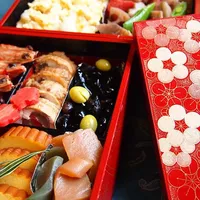お 正月 の たべ 物 ...(n 5) Foods for the New Year season
|しょうがつ|||ぶつ||foods|||new|year|
Oshogatsu no Tamashimono ... (n 5) Lebensmittel für die Neujahrssaison
Foods for the New Year season ...(n 5)
Oshogatsu no Tamashimono ... (n 5) Alimentos para la temporada de Año Nuevo
Oshogatsu no Tamashimono ... (n 5) Aliments pour le Nouvel An
Oshogatsu no Tamashimono ... (n 5) Cibi per la stagione di Capodanno
설날 음식 ... (n 5) 설날 시즌 음식
Oshogatsu no Tamashimono ... (n 5) Voedingsmiddelen voor het Nieuwjaar
Oshogatsu no Tamashimono ... (n 5) Alimentos para a época do Ano Novo
Ошогацу-но тамасимоно ... (n 5) Продукты питания для новогоднего сезона
新年季节的食物......(n 5)
新年食品...(n 5)
新年食品...(n 5)
お しょうがつ は 、一月 一日 から 一月 三日 ごろ まで の こと です。
|||ひと がつ|ひと にち||ひと がつ|みっにち|||||
Oshogatsu ist ungefähr vom 1. Januar bis ungefähr 3. Januar.
Oshogatsu is from around January 1st to around January 3rd.
Del 1 al 3 de enero.
Oshogatsu va dal 1 gennaio al 3 gennaio circa.
Oshogatsu is van 1 januari tot ongeveer 3 januari.
Oshogatsu是从1月1日到1月3日左右。
お しょうがつ は 、楽しみ が たくさん あります。
|||たのしみ|||
In der Schule gibt es viele lustige Dinge zu tun.
New Year has a lot of things to look forward to.
La gala es muy divertida.
Al gala ci si può divertire molto.
Er zijn veel leuke dingen te doen op school.
在学校里有很多有趣的事情可以做。
上 の しゃしん は 、おせち りょうり です。
うえ||||||
Das Foto oben zeigt Osechi-Gerichte.
The photo above is Osechi cuisine.
La foto de arriba muestra platos de Osechi.
La foto qui sopra mostra i piatti di Osechi.
De foto hierboven is nieuwjaarsvoedsel.
上图是年货。
いろいろな 食べもの が あります。
|たべもの||
Es gibt eine große Auswahl an Lebensmitteln.
There are various kinds of food.
Hay una gran variedad de alimentos disponibles.
È disponibile una vasta gamma di alimenti.
Er zijn verschillende soorten voedsel.
有各种各样的食物。
えび も タマゴ も やさい も なんでも あります。
||たまご|||||
Garnelen, Eier, Gemüse, alles.
Shrimp, eggs, vegetables, anything.
Gambas, huevos, verduras, de todo.
Gamberetti, uova, verdure, qualsiasi cosa.
Garnalen, eieren, groenten, alles.
虾、鸡蛋、蔬菜什么的。
おせち りょうり は 、いろ が きれい です ね。
New Year's dishes are beautiful in color.
Los colores de los platos Osechi son preciosos.
I piatti di Capodanno sono di un bel colore.
Nieuwjaarsgerechten zijn prachtig van kleur.
年菜颜色漂亮。
日本 りょうり は 、あじ だけ じゃ なく 、見て たのしむ こと も 大切 です。
にっぽん|||||||みて||||たいせつ|
In Japan ist es wichtig, nicht nur den Geschmack, sondern auch die Sehenswürdigkeiten zu genießen.
In Japan, it is important not only to taste, but also to see and enjoy.
Es importante disfrutar de los platos japoneses no sólo por su sabor, sino también por su aspecto.
Nella cucina giapponese, è importante godere non solo del gusto ma anche della vista.
In Japan is het belangrijk om niet alleen van de smaak te genieten, maar ook van het uitzicht.
在日本,不仅要享受美食,还要享受美景。
これ は お ぞうに です 。
Dies ist ein Elefant.
This is Zoni.
Esto es un elefante.
Questo è la zuppa.
Dit is een olifant.
这是一头大象。
スープ の 中 に お もち が あります 。
すーぷ||なか|||||
In der Suppe ist Mochi enthalten.
It's a soup with rice cakes in it.
Hay mochi en la sopa.
C'è del mochi nella zuppa.
Er zit rijstwafel in de soep.
汤里有年糕。
私 は 一度に 三 つ 食べます。
わたくし||いちどに|みっ||たべます
I eat three at a time.
Me como tres a la vez.
Ne mangio tre ( mochi, gnocchi di riso) alla volta.
Ik eet er drie tegelijk.
我一次吃三个。
東京 の お ぞうに と おお さ か の お ぞうに は 、あじ が 少し ちがいます。
とうきょう||||||||||||||すこし|
Es gibt einen kleinen Geschmacksunterschied zwischen den Elefanten von Tokio und den Elefanten von Osaka.
There is a slight difference in taste between the Zoni of Tokyo and the Zoni of Osaka.
El sabor de los elefantes en Tokio es un poco diferente al de los elefantes en Osaka.
Il sapore della zuppa di Tokyo è un po' diverso da quello della zuppa di Osaka.
Er is een klein smaakverschil tussen de olifanten van Tokyo en de olifanten van Osaka.
东京的大象和大阪的大象口味略有不同。
東京 は しょうゆ あじ です が 、おお さ か は みそ あじ が にんき が あります。
とうきょう|||||||||||||||
In Tokio ist Shouyu Aji die bevorzugte Geschmacksrichtung, in Osaka hingegen Miso Aji.
Soy sauce flavor is popular in Tokyo, but miso flavor is popular in Osaka.
En Tokio, el shouyu aji es el sabor preferido, pero el miso aji lo es en Osaka.
A Tokyo è preferito il gusto shouyu (salsa di soia), mentre a Osaka quello miso.
东京流行酱油味,大阪则流行味噌味。
東京有醬油和竹莢魚,大阪有味噌和竹莢魚。
皆さん の 国 は 正月 に どんな 食べ物 を 食べます か?
みなさん||くに||しょうがつ|||たべもの||たべます|
Everyone, what kind of food do you eat in your country on New Year's?
¿Qué se come en Año Nuevo en su país?
Che cosa si mangia a Capodanno nel vostro Paese?
元旦你的国家吃什么食物?

